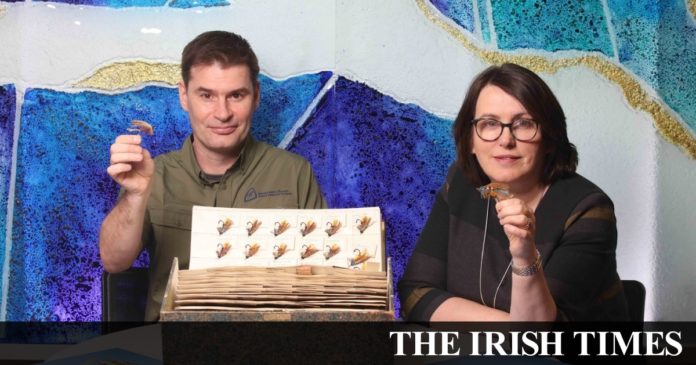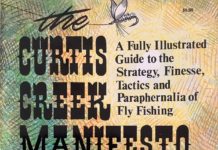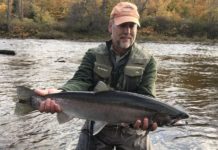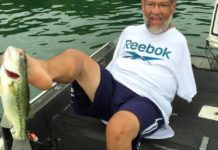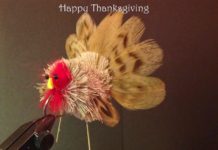Traditional Irish salmon flies, commissioned 120 years ago for the Cork International Exhibition in 1902, are set to feature in a new historical picture book to mark World Book Day.
Fly tying involves the “dressing” of a fishing hook to create an artificial fly. It’s a little-known part of Ireland’s heritage but many angling shops in Ireland in the late 1800s and early 1900s employed “fly dressers”. Some were considered masters of their craft thanks to their skills, creativity and the traditional methods they used.
In recognition of the cultural importance of this craft and to record examples a collection of fly dressings was commissioned in 1902, with specific sets of flies collected for each of the 20 fishery districts throughout the country.
The current custodians of this important collection, Inland Fisheries Ireland (IFI), published the 1902 Cork Collection of Salmon Flies picture book online last week, making it freely available to new generations around the world.
Over 100 years after the Cork International Exhibition took place, interest in the collection was re-ignited by angling author the late E.J. “Ted” Malone, who described the collection as a “long lost treasure of Irish angling”.
Malone worked alongside Peter Kealey and Peter Dunne, all fly tying experts, to meticulously examine, photograph and record the various fly dressings. Sadly Ted Malone passed away in 2017, and the book is dedicated to his memory.
Over 380 individual salmon flies have been catalogued representing districts such as Galway, Ballina, Killarney, Dublin, Ballyshannon and Lismore. These flies were often “dressed” for use on specific rivers or lakes, with subtle differences in hue and colour to reflect what was believed to be the best pattern on that fishery at a particular time of year.
IFI is exploring ways of putting the original collection on display once more and members of the public are being encouraged to contact the State agency with any suggestions they may have.
Shane O’Reilly of IFI said: “This new book offers a unique glimpse into Ireland’s past, showcasing the detail and beauty of traditional Irish salmon flies and the wide range of materials and techniques used by Irish fly dressers. Many of those fly dressers are now revered around the world for the quality of their craft, so this collection is of significant cultural importance too, and is now available for the next generation to discover.”
The 1902 Cork Collection of Salmon Flies is available to view at https://www.fisheriesireland.ie/news/press-releases/new-book-brings-long-lost-treasure-of-irish-angling-to-new-generations-around and from www.fishinginireland.info.
*****
As the angling world begins to return to a degree of normality following Covid, the Irish Specimen Fish Committee (ISFC) has issued an update on its plans for 2022.
First up is the annual report which is due for publication next month (April). The annual awards day (usually held in February) will be held at a later date this year.
Specimen fish rules updates:
Corkwing wrasse – 2021 was a data collection year for this species in order to set a realistic threshold. Data showed that the guideline length of 20cm total length was too low. The new threshold is being set at >24cm total length. This will apply to all claims received in 2021 and from now onwards.
Twaite shad – the threshold length from 2022 onwards is 50cm total length. From 2022 no weight-based claims will be accepted. The only exception is where a record shad is being claimed.
Perch – length-based specimen category added with a threshold of 40cm fork length.
Grey gurnard – threshold weight reduced to 600g and length based specimen category at 40cm total length introduced.
Note: The ISFC may advise on more changes before the 2021 annual report is published.
*****
Natural Resources Wales (NRW) is introducing restrictions on salmon fishing on the rivers Wye, Usk and Severn in response to the decline in migratory salmon stocks.
Numbers are currently among the lowest on record and are below sustainable levels. The byelaws are part of the commitment to restore Welsh salmon stocks as set out in the Salmon and Sea Trout Plan of Action.
Ben Wilson of NRW said: “Put simply, there are just not enough adult fish spawning to sustain stocks at their current levels or to prevent further decline. We continue to work with those with a stake in our river environments to protect our fisheries for future generations to enjoy.”
*If you have an angling story to share, please send to me at angling@irishtimes.com.
Note: Angling Notes can be viewed each Monday online at irish times latest news.com and irish times other sports.com.
Credit: Source link

















